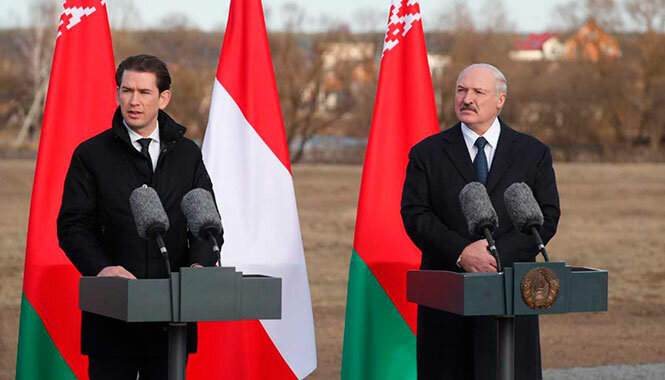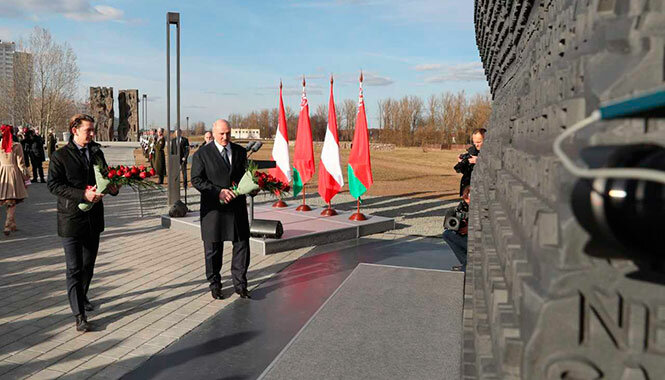Ceremony to unveil monument to Austrian victims of Nazism in Trostenets
- 10
- 4:14
Belarus President Aleksandr Lukashenko and Federal Chancellor of Austria Sebastian Kurz attended the ceremony to inaugurate the monument Array of Names in the territory of the Trostenets Memorial on 28 March.
“Peoples of Belarus and Austria just like all the nations of Europe have survived the common bloody tragedy of World War Two. Millions of our citizens fell victims to the Nazi policy of genocide. Today we stand united by the pain of memory and by the call of conscience, by the moral and human duty, by responsibility for the fate of future generations,” the head of state stressed.
Aleksandr Lukashenko remarked that crimes committed by the Hitler troops strike people as surpassing any bounds of cruelty. Mad, antihuman ideas of fascists took shape as the state policy of the Third Reich. Detailed plans were developed in order to expand their lebensraum to the east. The troops relied on accomplishments of science and technology and horrified with their pedantry. Racism recognized the existence of millions of people as unnecessary.
“It is no accident that Nazi concentration camps are referred to as death factories. They killed people in job lots. One of Europe’s largest ‘factories’ of the kind existed here, in Maly Trostenets. It is here that blood of many tens of thousands of innocent victims was spilled, including citizens deported from European countries, civilians, members of partisan units, underground resistance movement, and Soviet POWs,” the head of state said.
The President stated that the years of the German occupation represent one of the most tragic pages in Belarus’ history. “This is why the day our land was liberated from the Nazi invaders is our key state holiday, Independence Day. It is as important as Victory Day,” the head of state stressed.
“Memory of those, who have fallen fighting for the freedom and independence of their native country, fighting to free the planet from the brown plague, memory of victims of Nazism is sacred to our people. Taking good care of it has become part of the national idea,” the head of state said.
According to the President, the recognition of lessons of World War Two is also reflected in Belarus’ peace-loving foreign policy, in the persistent and genuine desire of Belarusians to make their own contribution to the resolution of conflicts, to the lowering of tensions by facilitating dialogue and cooperation in the region and the world.

“Belarus pays close attention to immortalizing memory of the victims of Nazi terror campaign. The memorial of pan-European importance in Trostenets is a result of joint efforts of the Belarusian state, politicians, public figures, representatives of religious organizations, civil servants and residents of European cities, and certainly the living witnesses of those times and relatives of the dead,” Aleksandr Lukashenko said.
In his words, the Belarusian side enthusiastically backed the Austrian initiative, primarily that of the President and the federal chancellor, to erect a monument in memory of the Austrian citizens, who died in the Trostenets death camp.
“Over 10,000 citizens of Austria were killed here. Women and children, old and young people. They were slaughtered simply due to their ethnic descent, for following a faith different from their butchers’, for adherence to some other ideology. The Array of Names Monument we are unveiling today will not simply retrieve names of thousands of victims out of oblivion. It stands as a symbol of the desire of new generations to know about the tragic fate of their ancestors and preserve memory of them,” the President said.
The monument is a reminder of how far aggression, which overpowers common sense, how far exorbitant political ambitions, anti-scientific and antihuman theories can take you, the head of state stressed.
“May this stone symbol become an eternal reminder of the fact that peace is very fragile and human life is priceless. Our sacred duty is to pass on memory about that war to the descendants, to warn the future generations not to repeat mistakes of the past, to preserve peace on earth,” Aleksandr Lukashenko stated.
On behalf of the Belarusian nation and himself personally Aleksandr Lukashenko thanked Sebastian Kurz and the Austrian delegation, who had come to Belarus to personally pay a tribute of respect and honor memory of those, who had been blamelessly burnt and killed at the site during World War Two. “It is a heroic deed on your part, on the part of the Austrian citizens, who live today. You show an example to other people of how victims of your nation should be treated because representatives of dozens of nations are buried here. But Austria was the first country to come here with memory. It is precious,” the President stressed.
Aleksandr Lukashenko and Sebastian Kurz placed lit oil lamps near the Gates of Memory Monument. After making speeches before those present the Belarus President and the Austrian chancellor laid flowers at the monument Array of Names while accompanied with mournful music. They observed a minute of silence in memory of the fallen.
Members of the Austrian delegation, representatives of the Jewish community, and war veterans also laid flowers and stones as a symbol of sorrow of the Jewish nation at the foot of the monument. Former inmates and families of the dead were special guests during the event.






















